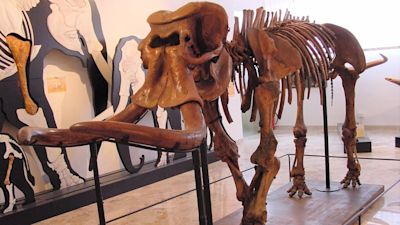Cambridge scientists discover extinct elephant shrank by 85% in 'intriguing' evolution
Sunday 20 June 2021, 11:37am

The 'Palaeoloxodon mnaidriensis' became extinct around 19,000 years ago.
Credit: PA
A new study by a team of researchers, including scientists from Cambridge, has found that a now-extinct species of dwarf elephant halved in height and shrank by nearly 85 percent on the island of Sicily.
The evolution, which researchers have described as "truly striking" took place over a period of 350 thousand years.
Scientists analysed molecular and fossil evidence to make the discovery and say it's comparable to modern humans dwarfing to the size of a Rhesus monkey.
A new study by a team of researchers, including scientists from Cambridge, has found that a now-extinct species of dwarf elephant halved in height and shrank by nearly 85 percent on the island of Sicily.
The evolution, which researchers have described as "truly striking" took place over a period of 350 thousand years.
Scientists analysed molecular and fossil evidence to make the discovery and say it's comparable to modern humans dwarfing to the size of a Rhesus monkey.

The research team included scientists from Cambridge University, Nottingham Trent, the University of York, and the Natural History Museum.Credit: ITV News
The 'Palaeoloxodon mnaidriensis' became extinct around 19,000 years ago. The species lost more than 8,000kg in weight and almost 2m in height after diverging from the much larger straight-tusked elephant Palaeoloxodon antiquus, which was almost 4m tall and weighed 10,000kg.
The magnitude of dwarfing resulting from this rapid evolutionary process is truly striking, resulting in a loss of body mass of almost 85% in one of the largest ever terrestrial mammals.< "As the descendants of giants, the extinct dwarf elephants are among the most intriguing examples of evolution on islands.Dr Axel Barlow, an expert in palaeogenomics and molecular bioscience
For their study, the team analysed the remains of a dwarf elephant unearthed from Sicily's Puntali Cave, thought to be between 175,000 and 50,000 years old.
They examined a piece of petrous bone - part of the skull that holds the inner ear - which is known to preserve DNA better than other parts of the skeleton.
The 'Palaeoloxodon mnaidriensis' became extinct around 19,000 years ago. The species lost more than 8,000kg in weight and almost 2m in height after diverging from the much larger straight-tusked elephant Palaeoloxodon antiquus, which was almost 4m tall and weighed 10,000kg.
The magnitude of dwarfing resulting from this rapid evolutionary process is truly striking, resulting in a loss of body mass of almost 85% in one of the largest ever terrestrial mammals.< "As the descendants of giants, the extinct dwarf elephants are among the most intriguing examples of evolution on islands.Dr Axel Barlow, an expert in palaeogenomics and molecular bioscience
For their study, the team analysed the remains of a dwarf elephant unearthed from Sicily's Puntali Cave, thought to be between 175,000 and 50,000 years old.
They examined a piece of petrous bone - part of the skull that holds the inner ear - which is known to preserve DNA better than other parts of the skeleton.
No comments:
Post a Comment